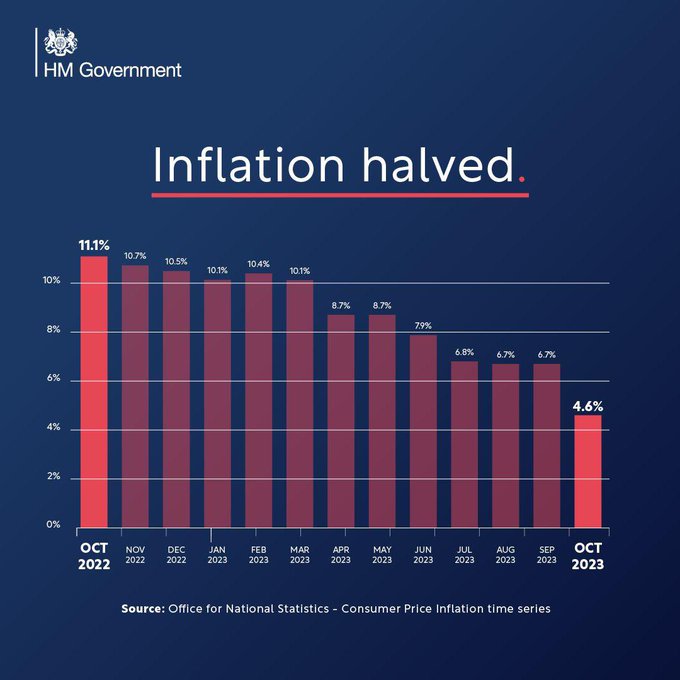Promise delivered: inflation halved
At the start of the year the Prime Minister laid out his five top priorities, starting with halving inflation.
New figures out today show that we have met our target to halve inflation by the end of the year. But there is more to do.
- The world has been grappling with high inflation, caused by the pandemic and Putin’s weaponisation of energy – which is why the Prime Minister made it his top priority to halve inflation.
- New figures this morning show thanks to action we have taken, such as holding down energy bills and taking responsible decisions with public finances, we have halved inflation from its peak of 10.7 per cent to 4.6 per cent in October – giving families the immediate relief they need.
- Inflation is a tax on people’s pockets – halving it is the best thing we could do to help people’s money go further. As we took the difficult decisions, Labour’s plans would lead to higher inflation for longer, with their £28 billion borrowing plan, risking higher interest rates too.
The Conservative government is easing pressures on households and helping with the cost of living by:
Meeting our promise to the British people to halve the rate of inflation, easing pressures on families. New figures show the rate of inflation is at 4.6 per cent, down from 10.7 per cent in November 2022. This means people’s money goes further each month than it would if inflation had been allowed continue at 10% plus levels, let alone let rip as might have happened if the policies suggested by most of the opposition parties had been followed.
Inflation has been reduced by:
- Resisting calls for additional borrowing and spending that would fuel inflation further, taking the long-term decisions for the economy. Conservatives took the difficult decisions to control public spending when inflation was at its peak – this included resisting pressure to fund above-inflation public sector pay settlements, despite Labour pushing us to do so (Source: HM Treasury, Policy Paper, 15 March 2023, link).
- Introducing ambitious measures to help people back into work, addressing the tight labour market – one of the main domestic drivers of inflation. The UK’s tight labour market leaves us exposed to inflationary pressures – this means we had to ensure employment remained high. We delivered a package of reforms at the Spring Budget, including uncapping pensions and expanding childcare, to do this (Source: HM Treasury, Policy Paper, 15 March 2023, link).
- Holding down energy prices, one of the main drivers of inflation, combatting Putin’s weaponisation of Europe’s energy supply. The Energy Price Guarantee held down inflation by 2.6 percentage points, whilst the Energy Bill Relief Scheme (EBRS) lowered headline inflation and the separate Energy Price Cap had a significant impact on the July inflation figures, reducing CPI inflation by 0.97 percentage points (Source: OBR, Economic and Fiscal outlook – March 2023, 15 March 2023, link).
- Delivering tax cuts at the Spring Budget to make day-to-day costs less expensive for families, holding down inflation further. Both the alcohol duty and fuel duty freeze at the Spring Budget reduced CPI inflation by nearly 0.75 percentage points this year, according to the Office for Budget Responsibility (Source: HM Treasury, Policy Paper, 15 March 2023, link).
What would Labour policies have meant?
- Labour are calling for billions of pounds of borrowing per year – including an inflationary £28 billion borrowing commitment.
- Labour have a plan to borrow £28 billion a year by the second half of their first parliament, with the Shadow Chancellor confirming Labour will take borrowing ‘up’ – the IMF estimate an increase of public expenditure by one percentage point would increase inflation by 0.5 percentage points (Source: BBC Radio 4 Today, 9 June 2023, archived; BBC Radio 4 Today, 9 October 2023, archived; IMF, On the path to policy normalisation, April 2023, link).
- The independent IFS has agreed that this is highly inflationary. Paul Johnson, Director of the Institute for Fiscal Studies, said: ‘It is hard to say how, without tax rises, they do anything more generous than is currently planned’. Johnson then said: further borrowing could ‘potentially increase inflation, and also drive up interest rates’ (Source: iNews, 31 May 2023, link).
- Labour wanted weaker public sector pay restraint which would have meant higher inflation. In January 2023, Shadow Health Secretary Wes Streeting said ten per cent pay rises were ‘reasonable’ – pushing for further borrowing to fund pay deals (Source: The Times, 6 January 2023, link).


Comments